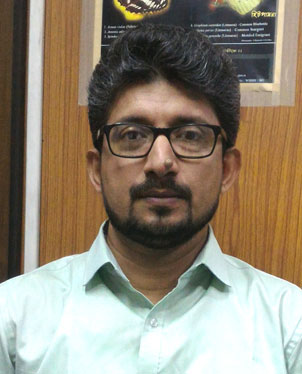 Govt. of W.B.
Govt. of W.B.

Maulana Azad College
Affiliated to the University of CalcuttaNAAC Accredited with 'A' Grade
DBT Star College with Star Status
College with Potential for Excellence (UGC) (2010)
 ADMIT CARD 2024 SEM V EXAMINATION 2024 :
B.A. Gen. | B.A. Hons. | B.Sc Hons | B.Com. Hons
ADMIT CARD 2024 SEM V EXAMINATION 2024 :
B.A. Gen. | B.A. Hons. | B.Sc Hons | B.Com. Hons

Post Graduate Department of Zoology
About the Department
Founded in 1996, the Department of Zoology of Maulana Azad College has been one of theleading departments, not only in West Bengal but also in the country. Postgraduate teaching was incorporated from the year 2000. It has not only provided up-to-date teaching resources but has also taken the lead in introducing CBCS curricula for PG course in Zoology. Introduction of subjects such as Genetics, Ecology, Fisheries and Aquaculture, Parasitology & Immunology and Entomology, for the last seventeen years in the PG teaching curricula, helped to develop the understanding of Biology as a living, growing science.
The growth and diversity in teaching has been made possible by the introduction of a progressive faculty, and largely due to the development of technical expertise and the creation of a good laboratory infrastructure from the UGC and State Government grants. In addition, DST-FIST support (2005 & 2010), UGC-CPE support (2010) and DBT Star College Award (2016) to the College have most substantially contributed to the achievements in research and teaching. The dept. has also received the prestigious DBT BOOST assistance (2015) from the State DBT.
Courses:
Under Graduate:
The Department of Zoology offers B.Sc. Honours Course in Zoology (CBCS system of the University of Calcutta) capable to house 35 numbers of student. The students are constantly guided by Nine esteemed full-time faculties and also specialised part-time and guest faculty. The classrooms are spacious with modern amenities. Laboratory facilities are excellent with all the modern instruments required for conducting practical experiments in under graduate level. Beyond all these the Department has well equipped smart class room for our students. Besides the excellent central library with wide ranges of books, the Department itself proffered seminar library harnessing specialized books for the students. An important event of the course curriculum is academic field workandZoological excursions. Excursions (local and out station excursion) are conducted for the betterment of the students. The excursion and field work programmes are compulsory and necessary for the future academic skill developments of the students.
Post Graduate:
The Department of Zoology successfully hold out Post Graduate Course in Zoology (CBCS system of the University of Calcutta) with all the modern facilities for the up-gradation of the students. This Department presently has 29 positions in M.Sc. curriculum with constant guidance from experienced full-time faculties from this institution as well as a number of renowned faculties, scientific personalities and academicians from different famous Universities and Institutions. The department has spacious class rooms to accommodate students perfectly. All the post graduate class rooms are equipped with modern teaching aids. Well-equipped computer laboratory with constant high-speed internet facility is another unique feature of the course. Besides, smart class rooms and e-classrooms are also dedicated for the student benefits. The department has well equipped laboratories furnished with up to date sophisticated instrumentation facilities to conduct modern Laboratory. Our post-graduation course has presently offered Genetics, Ecology, Fisheries and Aquaculture, Parasitology & Immunology and Entomology special paper options. All the specializations offer different respective laboratories with modern instruments like, PCR, Electrophoresis unit, Gel doc, electronic weighing machines, Gel documentation system, laminar air flow, TLC system, incubators, high end microscope with image capturing facility, pH meters etc. The department has a well-organized temperature-controlled culture room for tissue culture. A large number of Professors and Scientists from Universities and Institute directly engaged in development of our PG Department in different aspects. Students are encouraged by different project works to participate in different scientific poster presentation, seminar, scientific quiz competition for self-developments of the students both culturally as well as academically.
Syllabus:
PG (CBCS):
PG Syllabus : View
UG (CBCS):
UG-Zoology Syllabus CU : View
UG (Year wise):
UG Old Syllabus : View
Routine:
Zoology Online Class Routine UG +PG ODD SEMESTER routine Sep, 2021 : View
Learning Outcome
Learning Outcome : View
Zoology is a broad field of research that includes studying animals in their natural habitats to assess behaviors, living conditions and interactions with other wildlife. Medical researchers need to understand health problems before they can develop ways to treat them. Some diseases and health problems involve processes that can only be studied in a living organism. Animals are necessary to medical research when it is impractical or unethical to use humans. Monitoring animal health and preventing animal disease outbreaks is vital to the economy and safety of the country's food supply. Production of healthy livestock helps to ensure a safe food supply and keep consumer prices stable. Zoologists observe and sometimes conduct experiments on animals, either in the wild or in a controlled setting (such as a zoo or a laboratory). Zoology is important for many reasons. For one, the study of animals and communities provides insight into how "life" works, and, consequently, how we work
Here are the reasons why zoology matters so much:
To Appreciate Nature
Once you study the life cycles and food chain, you'll have a better understanding of nature's handiworks.
To Understand Animals
If you consider their nature and habitats, it will be clear that they become threats only when people interfere with their activities.
To Understand the Importance of Preservation
When you study animal life you learn of their habits, food and behaviour. You'll see that they are all integrated.
Zoology (along with Botany and Chemistry) is the ideal subject to understand life and living. It includes almost all aspects of life, especially the relationship among the various organisms. Students will be able to use the evidence of comparative biology to explain how the theory of evolution offers the only scientific explanation for the unity and diversity of life on earth. They will be able to use specific examples to explicate how descent with modification has shaped animal morphology, physiology, life history, and behavior and explain how organisms function at the level of the gene, genome, cell, tissue, organ and organ-system. Drawing upon this knowledge, they will be able to give specific examples of the physiological adaptations.
Students will be able to apply the scientific method to questions in biology by formulating testable hypotheses, gathering data that address these hypotheses, and analyzing those data to assess the degree to which their scientific work supports their hypotheses. 2. Students will be able to present scientific hypotheses and data both orally and in writing in the formats that are used by practicing scientists. 3. Students will be able to access the primary literature, identify relevant works for a particular topic, and evaluate the scientific content of these works. 4. Students will be able to apply fundamental mathematical tools (statistics, calculus) and physical principles (physics, chemistry) to the analysis of relevant biological situations. 5. Students will be able to identify the major groups of organisms with an emphasis on animals and be able to classify them within a phylogenetic framework. Students will be able to compare and contrast the characteristics of animals that differentiate them from other forms of life. 6. Students will be able to use the evidence of comparative biology to explain how the theory of evolution offers the only scientific explanation for the unity and diversity of life on earth. They will be able to use specific examples to explicate how descent with modification has shaped animal morphology, physiology, life history, and behavior. 7. Students will be able to explain how organisms function at the level of the gene, genome, cell, tissue, organ and organ-system. Drawing upon this knowledge, they will be able to give specific examples of the physiological adaptations, development, reproduction and behavior of different forms of life. 8. Students will be able to explicate the ecological interconnectedness of life on earth by tracing energy and nutrient flows through the environment. They will be able to relate the physical features of the environment to the structure of populations, communities, and ecosystems. 9. Students will be able to demonstrate proficiency in the experimental techniques and methods of analysis appropriate for their area of specialization within biology.
Lesson Plan
Lesson Plan 19-20 UG : View
Lesson Plan 20-21 UG: View
Lesson Plan 19-21 PG: View
Lesson Plan – 2022-23: View
PO & CO
Syllabus
Class Routine
- View Class Routine : View
Teaching / Lesson Plan
Question Bank
Faculty:
Open Resources
Gallery / Testimonials
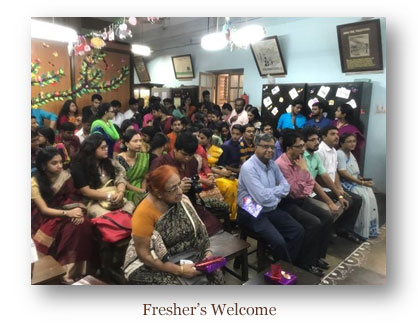
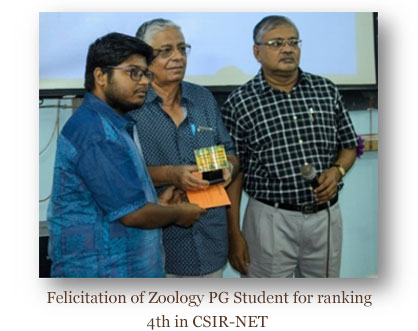
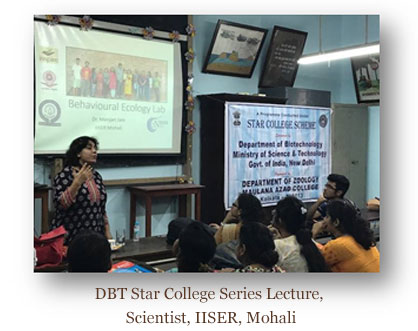
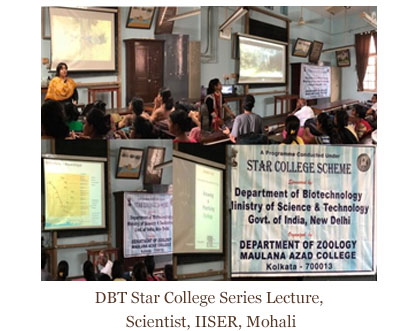
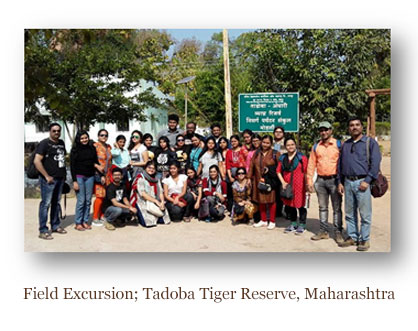
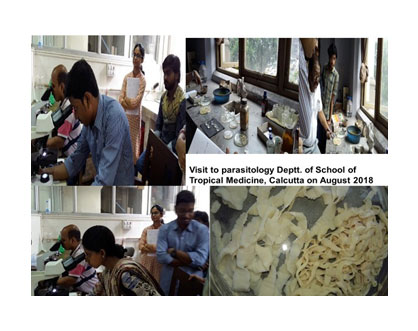


 ISO Certified -
ISO Certified - 
